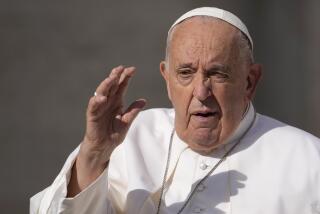Gay Catholics welcomed, cautioned
- Share via
Trying to narrow the gap between ministry and core beliefs, the nation’s Roman Catholic bishops on Tuesday affirmed the need to make parishes more welcoming to gays and lesbians, but said people who actively engage in homosexual activity should refrain from receiving Communion.
The guidelines overwhelmingly approved by the U.S. Conference of Catholic Bishops meeting in Baltimore sought to create a framework for being more supportive of homosexual believers.
But critics said the guidelines conveyed a mixed message.
“I think it’s a shame,” said Mariette Sawchuk of Los Angeles, a practicing Catholic and active member of Parents and Friends of Lesbians and Gays. “The message that Jesus gives us is an inclusive one. He always went out of his way to support the marginalized, and I think he would want us Catholics to do the same.”
Nicole Sotelo, a spokeswoman for the Catholic group Call to Action, agreed. “The bishops’ actions sadden me because they will only marginalize the majority of Catholics who believe it is immoral to discriminate against gays and that it is ethical to use birth control.”
Conservative Judaism and major Christian denominations -- including the Episcopal Church and Presbyterian Church (U.S.A.) -- are confronting similar questions this year about the role of gays and religion.
Also Tuesday, the Baptist State Convention of North Carolina, the nation’s second largest association of Baptist churches, voted to cut its ties with congregations that approved of homosexuality, adopting a policy that allowed the group to investigate whether member churches were “gay friendly.”
“It’s not something we wanted to do, but homosexuality is the only sin that has its own advocacy group,” said convention spokesman Norman Jameson in a statement. “Those advocacy groups are pushing us into this stance. Other denominations that waffle and waver on the issue are getting torn apart.”
R. Scott Appleby, a professor of Catholic history at the University of Notre Dame, summed up the conundrum facing the bishops. “The bishops are in a difficult situation, given that they are both pastors and teachers,” he said.
“As pastors they wish to be as compassionate, warm and loving, but as teachers they are also required to teach church doctrine as thoughtfully as they can,” Appleby said.
The bishops’ actions show they view homosexual orientation as “disordered, but not sinful,” he said.
In a secret ballot, the bishops voted 194 to 37, with one abstention, to adopt a document called “Ministry to Persons with Homosexual Inclination: Guidelines for Pastoral Care,” which was four years in the making.
Written by Bishop Arthur J. Serratelli of Paterson, N.J., chairman of the bishops’ doctrine committee, the document teaches that persons with “a homosexual inclination” must be accepted with respect, compassion and sensitivity, and it condemns violence, scorn and hatred.
It also underlines the faith’s teaching that although homosexual leanings are not necessarily “rejected by God or the church,” engaging in homosexual activity is inherently sinful and contrary to the divine plan.
Specifically, the guidelines encourage homosexuals to take a more active role in church activities, but urges them to remain celibate and not tell anyone other than close friends and family about their sexual orientation.
The guidelines free gays of a moral obligation to seek therapy, given that there is “no scientific consensus” on the cause of their sexual orientation.
The bishops also oppose same-sex unions and adoption by gay and lesbian couples, but recommend that priests baptize their children, provided they are raised in the Catholic religion.
“The positive thing is that bishops are trying, and welcome gays and lesbians into their parishes,” said Father James Martin, a Jesuit scholar who has written frequently on the subject.
“The drawback is that they are focusing almost exclusively on sexuality and repeat the church’s warnings, restrictions and admonitions about it,” he said.
The bishops Tuesday also called on Catholics who “knowingly and obstinately repudiate” church teaching on moral issues to not receive Communion.
The bishops approved the document, “Happy Are We Who Are Called to His Supper,” 201 to 24, with two abstentions.
During the 2004 presidential campaign, St. Louis Archbishop Raymond L. Burke said he would refuse to give Communion to Democratic presidential candidate John F. Kerry because of the Massachusetts’ senator’s support for abortion rights. On a voice vote, the bishops declined to amend the document to mention politicians.
*
More to Read
Sign up for Essential California
The most important California stories and recommendations in your inbox every morning.
You may occasionally receive promotional content from the Los Angeles Times.














